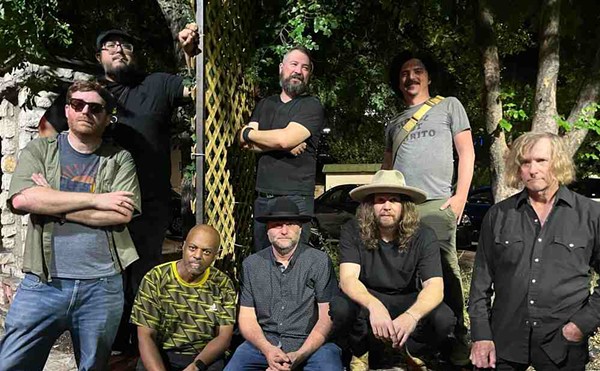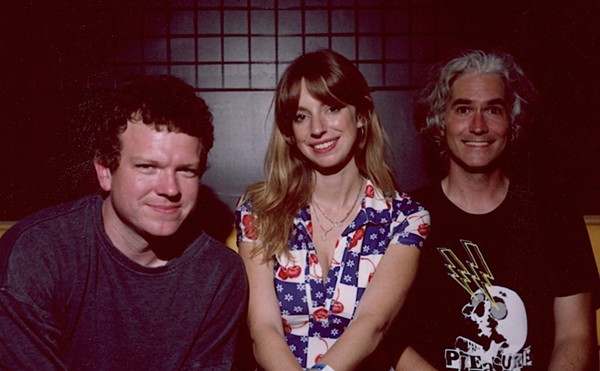| The Shins: grazing in the greenhouse (courtesy photo) |
A ll too familiar with his retro-obsessed characterization in the music press, James Mercer would like to clear up one common misconception. Contrary to popular belief, the soft-spoken songwriter of the Shins insists that he does not have his ear planted firmly in 1968.
"I certainly love the Zombies and the Beatles, but I like lots of different stuff," Mercer politely clarifies from his home in Portland, Oregon. "Like, right now I'm into the New-Wave stuff, like the Human League, that I listened to when I first fell in love with pop music. So do I listen to as much '60s music as people seem to think I do? Probably not!"
Not that anyone familiar with Oh, Inverted World would be blamed for assuming as much. After all, that acclaimed debut finds the group - currently including singer-guitarist Mercer, keyboardist Marty Crandall, bassist-guitarist Dave Hernandez and drummer Jesse Sandoval - taking considerable cues from that era's Hollies, Kinks and Zombies to create the most beguiling pop album of 2001.
To obsess over the record sleeves on which the Shins wear their hearts, however, is to miss what makes the group compelling. More than merely aping pop's past, they turn their catchy, off-kilter melodies and retrofitted summer sheen into the perfect subterfuge for Mercer's often grim, melancholic musings. So deceptively pretty are songs such as "New Slang" and "Caring Is Creepy," in fact, that it's easy to overlook all their disturbing lyrical references to death, bones, blood, and loneliness.
Formed in 1997, the Shins are a sequel of sorts to Flake Music, an indie-rock outfit from Albuquerque, New Mexico, that toiled in obscurity for years before Mercer decided to fashion a poppier, more accessible songwriting style. The new approach worked, and the freshly named group recorded a single and EP for Northen California's Omnibus Records before catching the attention of SubPop while touring with Modest Mouse. In early 2001, the Seattle imprint issued the band's "New Slang" single and offered to release a full-length.
| "Do I listen to as much '60s music as people seem to think I do? Probably not!" — James Mercer |
Even a self-described sluggish songwriter like Mercer, however, has to admit the rush paid off. When World hit shelves that summer, the band found itself fast becoming one of this era's biggest indie-pop bands. National airplay and media attention ensued, along with sold-out shows, larger venues, and high-profile festival performances. Ads for McDonald's and the Gap featured their music, as did television series such as The Sopranos and The Gilmore Girls. And while the album would ultimately sell more than 100,000 copies - a remarkable feat for an indie release - Mercer claims it took time for the band's success to sink in.
"It wasn't until later, when we started having requests to have our music in TV shows, that any of it seemed really impressive," he says.
It would probably do the unassuming Mercer well to get used to the attention. After all, the Shins' excellent sophomore effort, Chutes Too Narrow, finds the band poised on the brink of even bigger success.
With the help of producer Phil Ek (Quasi, Built to Spill), the album tweaks its predecessor's formula just enough to sound familiar, yet, as Mercer puts it, "more immediate and just brighter." And with songs such as the power-poppy "So Says I" and the countrified "Gone for Good," the compulsively listenable Chutes manages to stick in your pleasure centers faster and longer than almost anything on World.
Still, it's the jarringly bleak lyricism belying the songs' sunny surfaces that again gives the Shins an emotional heft lacking in most indie pop. Like a less surreal Jeff Mangum of Neutral Milk Hotel, Mercer breathes life into potentially tired topics (failed relationships, depression, etc.) with highly detailed imagery.
"One thing that really influenced me was this George Orwell essay," Mercer says. "In it, he basically says that if you're using clichés, it inherently means that you don't mean what you're saying because you're just using these idioms to communicate in a way that isn't really honest."
But if his lyricism would undoubtedly make George Orwell proud, Mercer would never believe as much. Indeed, throughout our conversation, he seems reluctant to accept that the Shins deserve their success.
"It's all such a relative thing," he says. "I mean, we are not a big band in comparison to any actually big bands. We're just tiny. We're invisible."
He pauses and laughs self-consciously, then sounds genuinely proud for the first time. "Then again," he says, "I'm not working a day job anymore, so we're big enough - exactly big enough. You know, I really couldn't ask for more." •

















